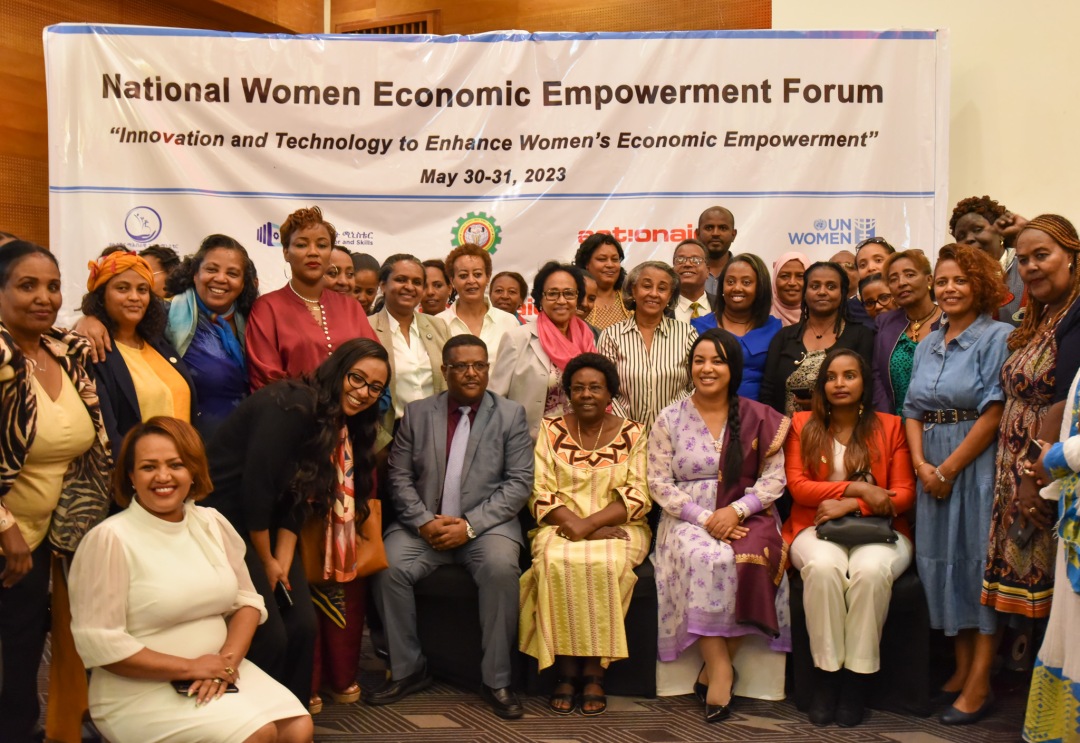The National Women’s Economic Empowerment (NWEE) Forum is an annual event that aims to foster dialogue and collaboration among various stakeholders working to advance women’s economic empowerment in Ethiopia. The forum was initiated in 2022 by UN Women Ethiopia, the Ministry of Women and Social Affairs (MOWSA), the Ministry of Labor and Skills, ActionAid Ethiopia and the Ethiopian Chamber of Commerce. The theme of this year’s forum, which took place on June 3-4, 2023, was “Innovation and Technology to Enhance Women’s Economic Empowerment”.
The forum was officially opened by Dr. Ergogie Tesfaye, the Minister of Women and Social Affairs, who highlighted the importance of the NWEE platform in creating synergies and partnerships among different actors striving for women’s economic empowerment. She also emphasized the need for coordinated efforts to address the multiple challenges that hinder women from participating in the economic sphere and urged all attendees to contribute their part to promote women’s economic empowerment.
The forum brought together policymakers, development practitioners, UN agencies, private sector actors, civil society organizations and researchers to discuss and share best practices and strategies for enhancing women’s access to resources and technologies. The forum also served as an opportunity to present and review the draft national gender equality and women empowerment policy, which was prepared by MOWSA with inputs from various stakeholders. The draft policy aims to provide a comprehensive framework for promoting gender equality and women empowerment in all sectors and spheres of life. The participants provided feedback and suggestions on the draft policy and agreed on the need to organize a separate session to further discuss it.
Several research papers focusing on gender finance gap, affirmative finance, gender responsive ICT policy and other relevant topics were also presented and discussed at the forum. The findings of the research papers provided evidence-based recommendations for addressing the existing gaps and challenges in promoting women’s economic empowerment. Moreover, different panel discussions were held on various issues related to women’s economic empowerment, such as access to finance, access to markets, access to skills development, access to innovation and technology, etc. The panelists shared their experiences and best practices in implementing gender responsive policies and programs that support women’s economic empowerment. The participants also engaged in lively discussions and raised questions and comments on the panel topics.


Even though several initiatives have been made to improve women’s access to finance, different challenges were also mentioned that limited women’s access to finance thereby putting limits in their participation in labor force and innovation and technologies. Some of these include
- Limited financial literacy of women: Many women lack the knowledge and skills to manage their finances, apply for loans, or invest in their businesses. This is limiting their engagement and success in the economic sector.
- Limited ID ownership of women: many rural women do not have any IDs, which prevents them from accessing saving and credit services offered by financial institutions. The current financing infrastructure therefore favours men, who are more likely to have IDs.
- Laws inhibiting women only cooperatives: in most rural cooperatives, heads of households, who are mostly men get to be members of cooperatives and the cooperative law does not allow establishing women only cooperatives.
- Data gap (lack of sex disaggregated and baseline data) to inform decision making: different actors working for economic empowerment of women (including policymakers) lack evidence to understand the situation to make informed decisions.
- Limited engagement of women in science and technology fields: women make up only 28 percent of the workforce in science, technology, engineering and math (STEM), which also limits their participation in innovation and technology.
The forum was a platform for sharing best practices and lessons learned on how to leverage technology and innovation to advance women’s economic opportunities. Some of the key takeaways that are relevant for RAISE-FS are:
- As women’s economic empowerment is one of RAISE-FS’ pillars, the forum can serve as a good opportunity for the project to promote innovation and technologies that can contribute to women’s economic and social empowerment in the agriculture sector.
- Investing in women’s economic empowerment can generate positive spill over effects for families, communities and society at large. Therefore, it is essential to mobilize adequate resources and partnerships to support women’s economic empowerment initiatives.
- Women face multiple barriers to access finance, such as discriminatory laws, social norms and practices. These barriers are more severe in rural areas, where women have more domestic duties and less mobility than men. Financial institutions often have limited and inconvenient hours of operation, which discourage women from seeking formal financial services. To promote women’s financial inclusion and empowerment, it is essential to address the structural factors that limit their participation in productive roles, as well as to introduce innovative and inclusive financial mechanisms for them.

The NWEE Forum concluded with a closing remark by Ms. Alemitu Omot, the state minister of MOWSA, who appreciated the active participation and contribution of all the attendees. She also reiterated the commitment of the ministry and other partners to continue supporting the NWEE platform and advancing women’s economic empowerment in Ethiopia. She called for sustained collaboration and coordination among all stakeholders to ensure that women have equal access to opportunities and resources that enable them to participate in and benefit from the economic development of the country.

